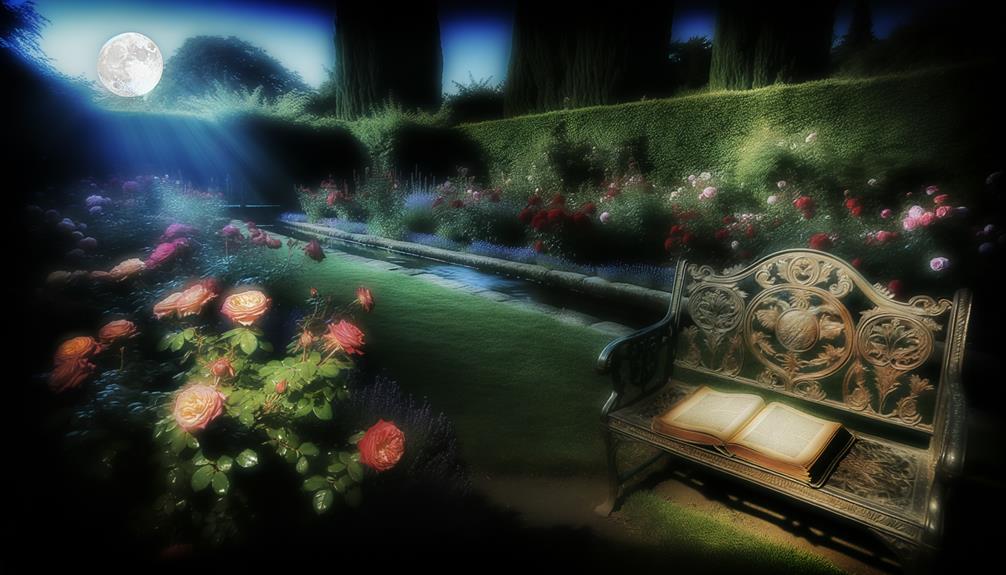Meaning of the Name Darcy
The name Darcy originates from the Norman French surname 'd'Arcy,' with 'd'' indicating geographic origin and 'Arcy' deriving from the Gallo-Roman name 'Arcius.' Historically, it was associated with nobility post-Norman Conquest in England. Its literary prominence rose through Jane Austen's 'Pride and Prejudice,' where Mr.
Fitzwilliam Darcy symbolizes romantic ideals. Modern usage of Darcy spans gender-neutral conventions in English-speaking countries and refers to a surname in France.
The name's popularity has fluctuated, influenced by cultural trends and media representations. Discover more intriguing details and historical nuances underpinning the rich legacy of Darcy.

Key Takeaways
- Darcy originates from the Norman French surname 'd'Arcy,' meaning 'of Arcy,' a location in France.
- The name signifies geographic origin or estate ownership from the commune of Arcy.
- Popularized by Jane Austen's character Mr. Fitzwilliam Darcy in 'Pride and Prejudice.'
- It symbolizes themes of nobility, social status, and romantic transformation.
- Darcy functions as a unisex name, reflecting gender-neutral naming trends.
Etymology of Darcy
The name Darcy originates from the Norman French surname 'd'Arcy,' which itself derives from the town of Arcy in Northern France. The prefix 'd'' signifies 'of,' indicating a geographic origin or estate ownership, a common practice in Norman nomenclature.
Linguistically, 'Arcy' likely stems from the Gallo-Roman personal name 'Arcius' combined with the locative suffix '-acum,' prevalent in place names in the region. The etymology underscores a connection to land and lineage, reflecting the societal structure of feudal France.
This surname was subsequently anglicized during the Norman Conquest of England in 1066, evolving into the more familiar 'Darcy.' Hence, the name encapsulates both a geographic and historical lineage, offering insights into its aristocratic roots and linguistic transformation over centuries.
Historical Background
The historical background of the name Darcy encompasses its literary origins, popularized by Jane Austen's 'Pride and Prejudice,' where Fitzwilliam Darcy epitomizes the quintessential gentleman.
The name's etymology traces back to the Norman French d'Arcy, indicating 'from Arcy'—a toponymic surname linked to the commune of Arcy in France.
Over centuries, Darcy has transcended its geographical roots, acquiring significant cultural resonance in English-speaking societies.
Literary Origins
Rooted in the rich tapestry of literary history, the name Darcy first gained prominence through the iconic character Fitzwilliam Darcy in Jane Austen's 1813 novel, 'Pride and Prejudice.'
This character, often referred to simply as Mr. Darcy, epitomizes the complex interplay between social status, personal pride, and romantic vulnerability. Austen's nuanced portrayal of Mr. Darcy has cemented the name in the literary canon, influencing countless adaptations and derivative works.
The character's evolution from a seemingly aloof aristocrat to a figure of deep emotional depth has rendered the name Darcy synonymous with the themes of transformation and integrity. Austen's work not only popularized the name but also imbued it with a legacy of enduring literary significance.
Name Etymology
Derived from Old French origins, the name Darcy historically signifies a lineage or geographic association, specifically referencing a person hailing from Arcy in La Manche, Normandy.
The etymology of Darcy traces back to the Norman Conquest, when Norman toponyms were introduced into England. The name 'd'Arcy' translates directly to 'from Arcy,' indicating a locational surname.
Linguistically, 'Arcy' likely derives from the Latin 'Arciacum,' which combines the personal name 'Arcius' with the suffix '-acum,' denoting possession or settlement. This transformation illustrates the melding of Latin and Old French influences, common in Norman nomenclature.
Understanding Darcy's etymology provides essential insights into its historical context, reflecting the migration patterns and cultural integrations of medieval Europe.
Cultural Significance
Understanding the etymology of the name Darcy provides a foundational basis for examining its cultural significance throughout history. Originating from the Norman French surname d'Arcy, meaning 'from Arcy,' the name traces back to the village of Arcy in La Manche, France.
Historically, the name gained prominence in England post-Norman Conquest, becoming associated with nobility and landed gentry. The name Darcy achieved literary fame through Jane Austen's 'Pride and Prejudice,' with Mr. Fitzwilliam Darcy epitomizing the romantic hero archetype. This literary association has bolstered the name's cultural resonance, leading to its enduring popularity.
Additionally, the name's unisex application in modern times reflects broader social shifts towards gender-neutral naming conventions, further embedding it in contemporary cultural consciousness.
Literary Associations
The name 'Darcy' evokes significant literary resonance, primarily through the character Fitzwilliam Darcy in Jane Austen's 1813 novel *Pride and Prejudice*. Mr. Darcy, a symbol of aristocratic pride and reserved demeanor, stands as an iconic figure in English literature. His complex personality and transformative journey from aloofness to emotional depth contribute to the name's enduring appeal.
| Attribute | Description | Example in Literature |
|---|---|---|
| Aristocratic | Associated with high social status | Mr. Darcy's wealth and estate, Pemberley |
| Reserved | Exhibiting restrained behavior | His initial interactions with Elizabeth Bennet |
| Transformative | Undergoing significant change | Darcy's evolution in character and actions |
| Iconic | Widely recognized and admired | Cultural imprint in adaptations and analyses |
This association has cemented 'Darcy' as a name synonymous with complexity and depth.
Cultural Significance
The name Darcy, with its roots in both French and Irish history, carries notable literary associations that extend to its modern cultural resonance.
Historically, the name has been imbued with social prestige, while its literary significance was cemented by Jane Austen's character Mr. Darcy in 'Pride and Prejudice.'
In contemporary culture, the name continues to evoke themes of sophistication and romantic idealism, illustrating its enduring appeal across generations.
Literary and Historical Roots
Emerging from both literary and historical contexts, the name Darcy holds significant cultural weight, particularly through its association with Jane Austen's iconic character, Mr. Fitzwilliam Darcy, from the novel 'Pride and Prejudice.' This literary figure has cemented the name in the public consciousness, symbolizing aristocratic elegance and complex personal growth.
Historically, Darcy traces its origins to the Norman surname d'Arcy, denoting a person hailing from Arcy in France. The name's linguistic roots lie in the Old French 'd'Arcy,' reflecting noble lineage and social distinction.
This dual heritage—both literary and historical—imbues the name with layers of meaning, blending fiction with genealogical significance, and ensuring its enduring presence in cultural and linguistic landscapes.
Modern Cultural Impact
Shaping contemporary cultural narratives, the name Darcy continues to evoke themes of sophistication and romantic idealism. Rooted in Jane Austen's immortal character, Mr. Fitzwilliam Darcy from *Pride and Prejudice*, the name has been perpetuated in modern media as a symbol of refined elegance and complex emotional depth.
This literary heritage has influenced its usage in various adaptations, from film to television, reinforcing its association with aristocratic charm and moral integrity. Linguistically, Darcy's French origin, denoting 'from Arcy,' enhances its aura of historical prestige.
In contemporary contexts, the name transcends gender, becoming a popular unisex choice that conveys a timeless appeal. Consequently, Darcy remains embedded in cultural consciousness, perpetuating a legacy of grace and enduring allure.
Popularity Over Time
Throughout history, the name Darcy has experienced varying levels of popularity, influenced by cultural trends and literary works. Its origins as a surname evolved into a given name, gaining prominence through notable figures and fictional characters.
For instance, Jane Austen's 'Pride and Prejudice' notably enhanced its appeal. The name's popularity has seen fluctuations, often correlating with societal changes and media representations.
Key points of influence include:
- Literary Impact: Austen's Mr. Darcy remains an iconic character.
- Media Influence: Television and film adaptations have strengthened its allure.
- Historical Figures: Various notable individuals in history bear the name.
- Changing Trends: Shifts in naming conventions reflect broader societal changes.
Understanding these factors provides insight into Darcy's enduring charm.
Regional Variations
The name Darcy exhibits notable regional variations, reflecting diverse cultural and linguistic influences across different parts of the world.
In English-speaking countries, Darcy often functions as a unisex name, derived from the Norman baronial surname d'Arcy, meaning 'from Arcy' in French.
In Ireland, Darcy is sometimes associated with the Gaelic name Ó Dorchaidhe, meaning 'descendant of the dark one.'
In France, Darcy remains mainly a surname with historical roots in the regions of Burgundy and Normandy.
In Australia and New Zealand, Darcy enjoys popularity as both a given name and surname, influenced by British colonial heritage.
Regional preferences highlight the adaptability of Darcy, showcasing its integration into local naming traditions and linguistic frameworks.
Famous Bearers
Several notable individuals named Darcy have left a significant impact across various fields, contributing to the name's enduring recognition and cultural relevance. The prominence of these figures underscores the versatility and timeless appeal of the name.
- Fitzwilliam Darcy: A central character in Jane Austen's classic novel 'Pride and Prejudice,' symbolizing 19th-century British aristocracy and romantic ideals.
- Darcy Bussell: Esteemed British ballerina, whose illustrious career at the Royal Ballet has cemented her legacy in the performing arts.
- Darcy Ribeiro: Influential Brazilian anthropologist and politician, known for his profound contributions to cultural and educational reforms.
- Darcy Ward: Australian speedway rider, celebrated for his achievements in international motorcycle racing.
Each of these individuals exemplifies the diverse domains in which the name Darcy has flourished.
Modern Usage
In contemporary contexts, the name Darcy continues to enjoy widespread popularity and versatility, reflecting its deep historical roots and evolving cultural significance. The name, originally stemming from the Norman barony of Arcy, has traversed centuries, acquiring fresh nuances in diverse cultures. Darcy remains unisex, appreciated for its adaptability in modern naming trends.
| Decade | Popularity (Rank) | Gender Distribution |
|---|---|---|
| 1980s | 150 | Mainly Male |
| 1990s | 120 | Increasingly Female |
| 2000s | 95 | Balanced |
| 2010s | 85 | Mostly Female |
Its presence in literature, especially Jane Austen's 'Pride and Prejudice,' has cemented its place in popular culture. Linguistically, Darcy's soft phonetics and timeless appeal contribute to its enduring charm, making it a favored choice among new generations.
Conclusion
The name Darcy, originating from the Norman baronial surname d'Arcy, has evolved through significant historical and literary contexts. Its cultural impact is evident in literature, especially in Jane Austen's 'Pride and Prejudice.'
The name's popularity has fluctuated over time, showing regional variations and adaptations. Famous individuals bearing the name further underscore its lasting influence.
Modern usage reflects a blend of historical reverence and contemporary appeal, demonstrating the name's enduring versatility and significance.






